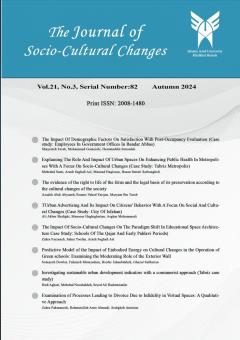Reviewing the processes leading to divorce (a qualitative study)
Subject Areas : Social issues of Iran
zahra pakmanesh
1
,
Rahmatullah AmiraAhmadi
2
*
![]() ,
sedigheh aminian
3
,
sedigheh aminian
3
![]()
1 - PhD student in sociology, majoring in Iranian social issues, Azadshahr Branch, Islamic Azad University, Azadshahr, Iran.
2 - Assistant Professor, Department of Sociology, Faculty of Humanities, Azadshahr Branch, Islamic Azad University, Azadshahr, Iran.
3 - Assistant Professor, Department of Sociology, Faculty of Humanities, Azadshahr Branch, Islamic Azad University, Azadshahr, Iran. (Corresponding Author)
Keywords: Divorce, Processes leading to divorce, Mashhadi couples.,
Abstract :
Divorce is one of the phenomena that families are faced with, the present study with the premise that in the transitioning society of Iran, one of the structural changes in the family is the change in the shape of relationships and emerging relationships in the family, the upcoming article aims to discover the processes of led to divorce and was done using a qualitative approach and thematic analysis method, the statistical population of Mashhad couples on the verge of divorce and the sample included 20 Mashhad couples on the verge of divorce who referred to premarital counseling centers, the sampling method in this research , purposeful sampling and the data collection tool was in-depth interviewSampling continued until theoretical saturation was reached. The findings of the interviews were coded in three stages and finally the divorce process was identified as consisting of five stages: the first stage: tension and conflict, the second stage: emotional separation, the third stage: decision to divorce, the fourth stage: physical separation and the fifth stage: legal divorce".
منابع منابع داخلی محسنیتبریزی، علیرضا(1395).روش تحقیق کیفی در مکاتب تفسیری (زمینه و کاربرد)، تهران: اطلاعات.
کوربین، جولیتام. و استراس، آنسلم (1390).اصول روش تحقیق کیفی: نظریه مبنایی، رویهها و شیوهها، ترجمه بیوک محمدی، تهران: پژوهشگاه علوم انسانی و مطالعات فرهنگی.
محمدپور، احمد(1392).روش تحقیق کیفی ضد روش: (مراحل و رویههای عملی در روششناسی کیفی) ، تهران: جامعه شناسان.
حضرتی صومعه, زهرا, & رحیمی, محمد. (1394). بررسی جامعهشناختی رابطه رسانههای جدید و شکاف بین نسلی در بین جوانان 20 -28 ساله و والدین شان. مطالعات راهبردی ورزش و جوانان, 14(30), 123-143.
ریتزر، جورج(1391).نظریه جامعهشناسی در دوران معاصر، ترجمه محسن ثلاثی، تهران: نشر علمی.
ذکائی، محمد سعید. (1387). جامعه شناسی جوانان ایران، تهران: آگه.
ابوت،پاملا و والاس، کلر (1395). جامعهشناسی زنان، مترجم منیژه عراقی، تهران: نشرنی. سیدمن، استیون(1398).کشاکش آرا در جامعهشناسی، مترجم هادی جلیلی، تهران: نشرنی.
سخنرانی مقام معظم رهبری، 30اردیبهشت 1395.
رحماني فضلي، عبدالرضا. (1395). ارائه گزارش دستگاه¬هاي اجرايي به رهبري، 24 ارديبهشت1395، گفت وگو وزير كشور با ايسنا.
رنجبر بهرام، شرافتي پور جعفر(1395)، تاثير از هم گسيختگي خانوادگي بر خياباني شدن زنان، انتظام اجتماعي، دوره 8، شماره 1: 58-35.
تاجبخش، کیان و همکاران. (1384). اعتماد، دموکراسی و توسعه. تهران: نشر شیرازه.
منابع خارجی Clayton, A.; Oakley, P.; Taylor, J. )2000(. Civil society organizations and service provision. Civil Society and SocialMovements, Programme Paper No. 2. Geneva: UNRISD
. Ream, R. (2005). Toward understanding how social capital mediates the impact of mobility on Mexican-American achievement. Social Forces 84 (1) , 201-224
Downey, D.B. (1995). When bigger is not better: family size, parental resources, and children’s educational performance. American Sociological Review, 60,746-761
Coleman, J. S. (1988), Social Capital in the Creation of Human-Capital,American Journal of Sociology, 94, S95-S120و

